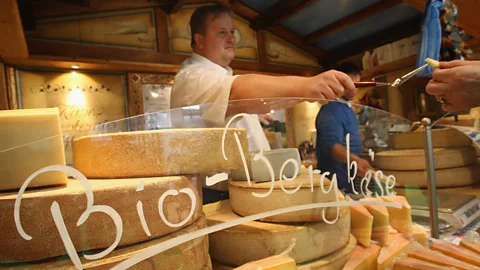What the German language reveals about attitudes to work
 Getty Images
Getty ImagesSmall expressions bind German workers together and remind them of the importance of their free time, writes Joseph Pearson.
Spending time in a German office can be confusing for a foreigner. The staff greet each other – often in sing-song voices – with the word “lunchtime!” instead of hello. It’s only 11am. What have you misunderstood?
In Germany, the word Mahlzeit (Mall-zayt; a composite of the German words for ‘meal’ and ‘time’) is a standard, yet baffling workplace greeting. And since language creates worlds, the proliferation of Mahlzeit can also reveal a great deal about German working culture.
You could be forgiven for thinking that Germany, Europe’s largest economy, is all about work. They have some of the highest levels of productivity in the world, with unemployment rates at a record low of just 4.1%.
This year, the International Monetary Fund (IMF) reported that Germany’s “employment growth is strong… growth is above potential, and the fiscal position keeps strengthening”. But Germans don’t fall neatly into the stereotype of rigid or robotic workaholics. Instead, Germans take more days off than anywhere else in Europe, when one counts annual leave and official holidays.
 Getty Images
Getty ImagesGerman workplace language helps us understand this curious balance of work and play. Despite the famous German work ethic, Mahlzeit, along with a number of other popular words used in German workplaces, uncover a surprisingly relaxed approach to work. There are the Brückentage, or ‘bridge days’, that you take off around bank holidays. Then there are common expressions, such as ‘Erst die Arbeit, dann das Vergnügen!’ - which translates as ‘first work, then pleasure’.
Arbeitsunfähigkeitsbescheinigung, the composite of the German words for ‘work’ and ‘inability’ and ‘certificate’, is a useful expression that can get you a sick day off, no questions asked. It is a revealing insight into this German attitude to taking leave, according to Ulrich Juergens, who researches workplace organisation and corporate governance at the Berlin Social Science Centre.

“There is a strong feeling, for example, that whenever you feel sick, you should stay at home," he says. "It’s your right. There would never be a critique of this. When you are sick, you are sick. ‘Wenn man krank ist ist man krank.’”
It is an attitude that workers in other cultures now may find alien. In many workplaces in the US, the UK and elsewhere in Europe, taking days off sick has become frowned upon to the point where many employees will attempt to struggle through their illness in the office. Meanwhile, the Germans take twice as many as many sick days per year as UK workers.
Lunch breaks
The role of Mahlzeit in German workplaces, however, is harder to decipher. Martina Schäfer has been teaching German for business at the Goethe Institute in Berlin for thirty years. She says the concept of Mahlzeit confuses her students.
 Getty Images
Getty Images“You can’t necessarily anticipate that tomorrow Mahlzeit will be used as a greeting because Mahlzeit has many connotations," she says. "(It) can be ironic, can reveal hierarchy, be funny, or serious.”
The expression even pops up in The Brothers Grimm stories but it’s difficult to translate in its modern context because it’s only ever used at work, never at home. You wouldn’t say it to your partner on a Saturday, for instance. And it can be used to express anything from being fed up, to using it as a response when someone burps.
But while a newcomer may struggle to use it at the appropriate time, they can quickly pick up why Mahlzeit it is such a pervasive word in the German workplace.
“The act of going to lunch together is still extremely important in Germany,” says Markus, a middle manager in Volkswagen’s central headquarters in Wolfsburg who didn’t want to use his last name. “If you put a meeting in between 12 and 1 pm, it’s a sure-fire way to get the staff annoyed with you. You are imposing unofficially on their free-time, even if they are getting paid for their lunch hours. And Germans care about their free time.”
 Getty Images
Getty ImagesGerman workers also often use Mahlzeit as a form of solidarity and it has a distinctively working-class connotation. It reminds them of the importance of their free time, and the need to protect it from overzealous bosses as German workplaces are often dominated by a ‘Tagesordnung’ culture, or ‘agenda’ culture, where everything is minutely scheduled.
Subway drinks
Another popular farewell at the end of the day in the German workplace is Schoenen Feierabend!, which is a composite of the words for ‘party’ and ‘evening’. Like Mahlzeit it too marks a clean break between work and play.
 Getty Images
Getty ImagesMarkus says while Germans are often stereotyped as hardworking and industrious, this doesn’t reflect the whole picture. “That’s why the Feierabend is important," he says. "And there is this great word – Feierabendbier (meaning ‘party’ and ‘evening’ and ‘beer’). It's one word, no kidding. This is what you drink from work on the subway. Or when you get home. You have the Feierabendbier out. It’s an institution.”
Of course, there are many workers in Germany doing long hours and skipping lunch, but there is a persistent general attitude to maintaining distinct separation between work and social life that sneaks out in workplace language.
Data show a mismatch between how Germans feel about their jobs and their life in general. Eurostat reports that Germans are some of the least satisfied workers in Europe. A full quarter – similar to the UK – are unhappy in their job, compared to just 5% in the Netherlands. On the other hand, Germans have among the highest levels of life satisfaction.
Many analysts scratch their heads over this puzzle: there’s usually a correlation between these two data sets. Perhaps they simply need to reflect more deeply on how much more importance is placed by Germans on Mahlzeit and that institutional Feierabendbier.
To comment on this story or anything else you have seen on BBC Capital, please head over to our Facebook page or message us on Twitter.
If you liked this story, sign up for the weekly bbc.com features newsletter called "If You Only Read 6 Things This Week". A handpicked selection of stories from BBC Future, Culture, Capital and Travel, delivered to your inbox every Friday.
